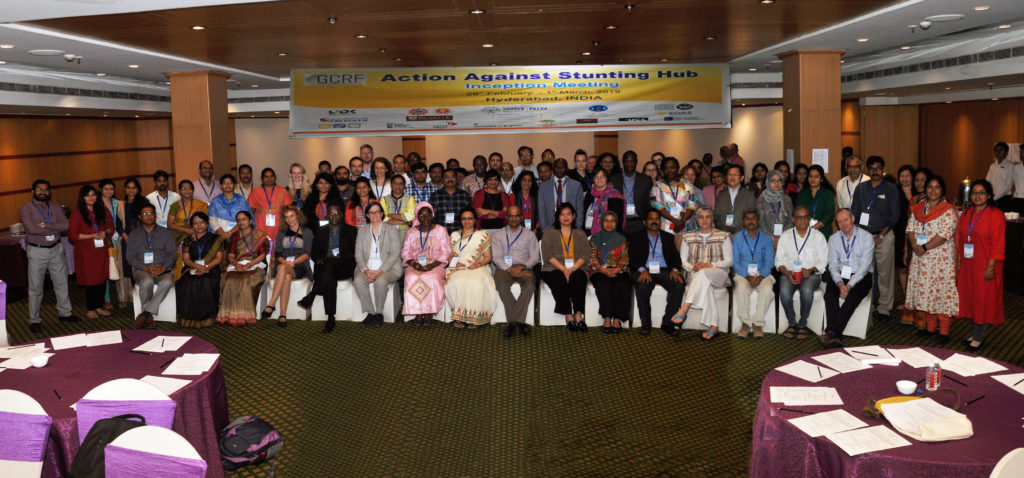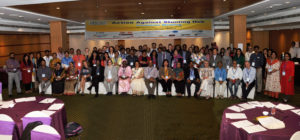Latest news
UKRI GCRF Action against Stunting Hub Inception Meeting: A Round Up
March 15, 2019
The UKRI GCRF Action against Stunting Hub is an £19.76 million investment by the UK government to alleviate child stunting, globally. It is funded by UK Research and Innovation (UKRI) through the Global Challenges Research Fund (GCRF), which is a key component in delivering the UK AID strategy and puts UK-led research at the heart of efforts to tackle the United Nations Sustainable Development Goals. From 28th February to 1st March, we held the Hub’s Inception meeting in Hyderabad, India. The meeting aimed to enable Hub participants to meet for the first time and establish a shared ethos.
On 28th February, the Hub welcomed 50+ people to the first day of the Inception meeting, which took place in the Marriott Hotel, Hyderabad. The meeting brought together representatives of the Hub’s 18 partner organisations, academic researchers, and local policy professionals.
Introduction
First of all, Dr. Avula Laxmaiah, Scientist G (Director Grade Scientist) & Head, Division of Public Health Nutrition, National Institute of Nutrition, India (NIN), opened the event with a warm welcome to our guests. He then introduced the other speakers for the day.
From there, Hub co-investigators gave an overview of the impact of child stunting in India, Indonesia, and Senegal, the Hub’s principal sites of investigation. Dr Bharati Kulkarni, Co-Investigator, NIN, stressed the high levels of child stunting and undernutrition in India. As a result, tackling stunting is a major priority for the federal government. For her part, Dr. Umi Fahmida, Co-Investigator, SEAMEO RECFON, observed that there is little knowledge on the determinants of stunting in Indonesia. Similarly Professor Babacar Faye, Co-Investigator, Université Cheikh Anta Diop, noted the paucity of evidence on the microbiome and gut health, and other factors, which help trigger stunting.
Following this, Professor Claire Heffernan, LIDC Director, Principal Investigator, presented the Hub’s scientific rationale, objectives, and the Whole Child approach. She stressed that child stunting remains a wicked problem, as we fundamentally do not understand the tipping points that pushes children from good growth to slow/no growth. Professor Heffernan also emphasised the Hub’s ambition to radically change the way that we deal with child stunting.
Setting the Scene
Following this, Professor Marie Harder, Co-Investigator, University of Brighton, discussed the Hub’s efforts to situate its research and action within a context of local values and shared-understanding. She affirmed the importance of involving local people throughout the research process. Researchers also need to make implicit knowledge and values explicit. Subsequently, Dr. Todd Rosenstock, Co-Investigator, World Agroforestry Centre, International Council for Research in Agroforestry, explored how secondary data analysis would underpin the Hub’s research.
Research priorities and thematic areas
Professor Paul Haggarty, Co-Investigator, Deputy Project Lead, Rowett Institute, University of Aberdeen, then gave an overview of the Child and research outputs. He stressed the Hub’s goal to ameliorate or even reverse stunting. It will also seek to move beyond a simple physical definition of stunting. Professor Joanne Webster, Co-Investigator, Royal Veterinary College, then gave an overview of the Hub’s examination of parasitic infections, which play a key role in child stunting. She noted that it is imperative to focus on the effects in babies and small children.
Afterwards, Professor Alan Walker, Co-Investigator, Rowett Institute, University of Aberdeen, introduced the Hub’s work on the microbiome, which will explore links between child stunting and the microbiota. He noted increasing evidence of delayed onset of microbiota maturation in malnourished children.
Afterwards, Professor Stephen Allen, Co-Investigator, Liverpool School of Tropical Medicine, discussed the Hub’s efforts to track gut health and growth. Finally, Dr Elaine Ferguson, Co-Investigator, London School of Hygiene & Tropical Medicine (LSHTM), previewed efforts to investigate diets of mothers and children across the three sites.
Environment
Our third session gave an overview of the Hub’s work on environment. First, Robert Dreibelbis of LSHTM introduced work on Water, Sanitation and Hygiene (WASH), behaviour and messaging for social change. He explained that researchers aimed to develop partnerships with industry and businesses. Moreover, they will employ innovative communication channels.
From there Professor Lynn Ang and Professor Julie Dockrell, Co-Investigators, UCL Institute of Education, explored how the Hub would investigate the educational environment surrounding the Whole Child. They emphasised that research would focus on the ways early child development can mitigate the effects of stunting. Importantly, they would create context-specific research tools. These will be culturally sensitive, collaboratively designed, and agreed with country teams.
Our next speakers, Professor Bhavani Shankar, Co-Investigator, SOAS, University of London, Dr Barbara Haesler, Co-Investigator, Royal Veterinary College (RVC), Dr Delia Grace, Co-Investigator, International Livestock Research Institute (ILRI), Dr Paula-Domingues Salas, Co-Investigator, LSHTM, Dr Elaine Ferguson, and Dr Suneetha Kadiyala, LSHTM, presented the Hub’s work on the food environment. They noted that markets were a crucial space. To enhance their effectiveness, they needed to be scaled up and improved to provide healthy foods.
Dr. Purnima Menon, International Food Policy Research Institute, then gave advice on changing thinking and policy. She called on Hub members to invest in teaching and learning from policy actors. They should also be available and proactive.
Following this, Hub researchers introduced the various interventions from nutrition to gut health and market.
Public Engagement, Citizen Science and Theory of Change
After a short break, Rachel Mason, Associate Director, Science Made Simple, explained how the organisation would build bridges between Hub researchers and the public. Professor Heffernan then discussed the Hub’s citizen science work.
Dr Marie Gaarder, Dr Monica Jain, Co-Investigators, International Initiative for Impact Evaluation (3ie) rounded off the day. Their presentation explained how they would help rigorously prove the effectiveness of the Hub’s work.
We are grateful to all attendees for their hard work and collaboration in ensuring the success of the meeting.

The UKRI GCRF Action against Stunting Hub after a successful meeting

